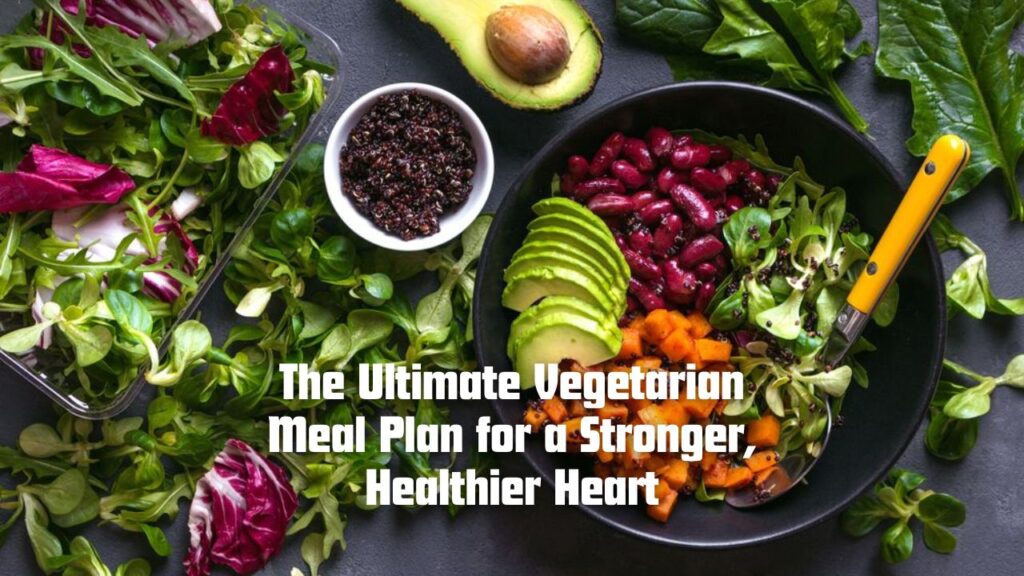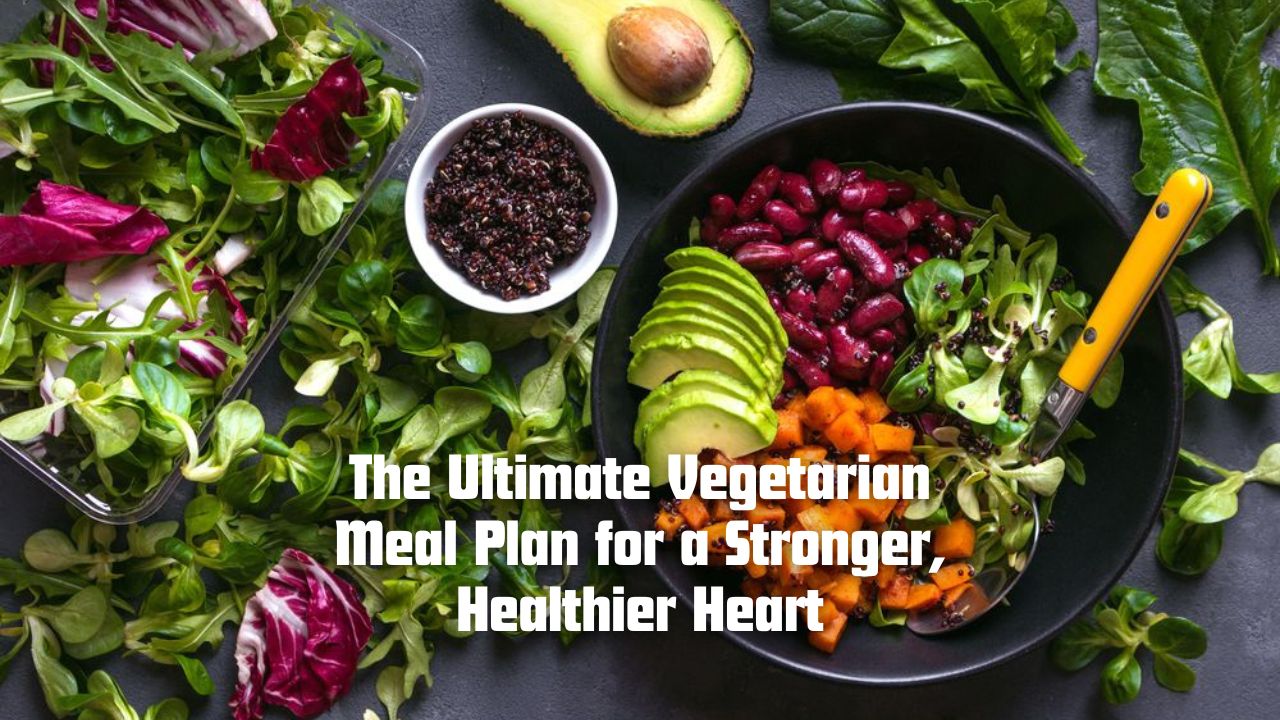The Ultimate Vegetarian Meal Plan for a Stronger, Healthier Heart
A healthy heart is the key to a long and active life. One of the best ways to take care of your heart is by following a vegetarian diet. A well-planned vegetarian meal plan can help reduce the risk of heart disease, high blood pressure, and cholesterol problems. This article will provide a simple, plagiarism-free, and easy-to-follow vegetarian meal plan that will help you build a stronger, healthier heart.
Why Choose a Vegetarian Diet for Heart Health?
A vegetarian diet is rich in fruits, vegetables, whole grains, nuts, seeds, and legumes. These foods contain essential nutrients, fiber, antioxidants, and healthy fats that support heart health.
Benefits of a Vegetarian Diet for the Heart:
- Lowers cholesterol: Plant-based foods have little to no saturated fats, which help reduce bad cholesterol (LDL).
- Reduces high blood pressure: Vegetables and fruits are high in potassium, which helps control blood pressure.
- Supports weight loss: A vegetarian diet is usually lower in calories, helping to maintain a healthy weight.
- Decreases risk of heart disease: Plant-based diets are linked to a lower risk of heart attacks and strokes.
By following a vegetarian meal plan, you can protect your heart while enjoying delicious and nutritious foods every day.
The Best Foods for a Heart-Healthy Vegetarian Diet
To build a stronger heart, you should include the following heart-friendly foods in your diet:
1. Fruits and Vegetables
- Berries (strawberries, blueberries, raspberries) – High in antioxidants.
- Leafy greens (spinach, kale, lettuce) – Rich in vitamins and minerals.
- Tomatoes – A great source of lycopene, which improves heart health.
2. Whole Grains
- Brown rice, quinoa, oats, whole wheat bread – Help lower cholesterol.
- Barley and bulgur – Improve digestion and blood sugar levels.
3. Nuts and Seeds
- Almonds, walnuts, flaxseeds, chia seeds – Provide omega-3 fatty acids for a healthy heart.
4. Legumes and Beans
- Lentils, chickpeas, black beans, kidney beans – High in protein and fiber, keeping your cholesterol in check.
5. Healthy Fats
- Olive oil, avocado, coconut oil – Replace unhealthy fats with heart-friendly fats.
Including these foods in your daily meal plan will help you build a healthier heart naturally.
A Sample 7-Day Vegetarian Meal Plan for Heart Health
Below is a simple and balanced meal plan for a stronger, healthier heart. Each meal contains heart-friendly nutrients to help reduce the risk of heart disease.
Day 1
- Breakfast: Oatmeal with berries, chia seeds, and almonds.
- Lunch: Lentil soup with whole wheat bread and a side of steamed broccoli.
- Dinner: Quinoa salad with avocado, walnuts, and spinach.
Day 2
- Breakfast: Whole wheat toast with peanut butter and banana.
- Lunch: Chickpea salad with cucumber, tomatoes, and olive oil.
- Dinner: Brown rice with stir-fried vegetables and tofu.
Day 3
- Breakfast: Greek yogurt with flaxseeds and blueberries.
- Lunch: Black bean burrito with whole wheat tortilla and guacamole.
- Dinner: Baked sweet potatoes with spinach and feta cheese.
Day 4
- Breakfast: Smoothie with almond milk, kale, banana, and chia seeds.
- Lunch: Whole wheat pasta with tomato sauce and basil.
- Dinner: Stir-fried tempeh with brown rice and green beans.
Day 5
- Breakfast: Avocado toast on whole grain bread.
- Lunch: Quinoa bowl with roasted vegetables and tahini dressing.
- Dinner: Vegetable curry with lentils and whole wheat roti.
Day 6
- Breakfast: Chia pudding with almond butter and sliced mango.
- Lunch: Hummus with whole grain pita and carrot sticks.
- Dinner: Black bean chili with quinoa and fresh cilantro.
Day 7
- Breakfast: Smoothie bowl with oats, nuts, and berries.
- Lunch: Spinach and lentil soup with whole wheat crackers.
- Dinner: Stuffed bell peppers with quinoa, black beans, and tomatoes.
This 7-day vegetarian meal plan ensures your body gets all the nutrients needed for a healthy heart.

Tips to Maintain a Heart-Healthy Lifestyle
Eating heart-healthy meals is just one part of the journey. To achieve a stronger, healthier heart, follow these lifestyle tips:
1. Stay Physically Active
- Exercise at least 30 minutes a day to keep your heart strong and active.
- Walking, jogging, cycling, and yoga are great heart-friendly exercises.
2. Drink Plenty of Water
- Staying hydrated helps improve blood circulation and keeps your heart working properly.
3. Limit Processed Foods
- Avoid packaged foods, fast food, and sugary drinks, as they contain unhealthy fats and high sodium.
4. Reduce Stress
- Practice meditation, deep breathing, or spend time in nature to keep stress levels low.
5. Get Enough Sleep
- A lack of sleep can increase the risk of heart disease. Aim for 7-9 hours of sleep per night.
By making these small changes, you can improve your heart health and overall well-being.
Final Thoughts: A Heart-Healthy Vegetarian Diet for Life
A vegetarian diet is not just good for the heart but also for overall health and well-being. By including nutrient-rich foods and following a balanced meal plan, you can reduce the risk of heart disease and enjoy a longer, healthier life.
Remember to:
✔ Eat fruits, vegetables, whole grains, nuts, and seeds daily.
✔ Avoid processed foods and unhealthy fats.
✔ Stay active and stress-free.
✔ Drink plenty of water and get enough sleep.
Start your vegetarian journey today and give your heart the care it deserves!
FAQs:
1. Can a vegetarian diet really improve heart health?
Yes! A vegetarian diet is rich in fiber, antioxidants, and healthy fats, which help lower cholesterol, blood pressure, and the risk of heart disease.
2. What are the best vegetarian protein sources for heart health?
Great plant-based proteins include lentils, chickpeas, black beans, quinoa, tofu, tempeh, nuts, and seeds. These foods provide essential amino acids and help keep your heart strong.
3. How can I get enough omega-3 fatty acids without fish?
You can get omega-3s from flaxseeds, chia seeds, walnuts, hemp seeds, and algae-based supplements. These help reduce inflammation and improve heart health.
4. Are all vegetarian foods healthy for the heart?
No. Processed vegetarian foods like chips, sodas, and sugary snacks can still be high in saturated fats, salt, and sugar, which harm the heart. Choose whole, unprocessed foods instead.
5. How do I plan a balanced vegetarian meal for heart health?
Include a mix of whole grains, vegetables, legumes, healthy fats, and proteins in every meal. Avoid fried foods and excessive salt to keep your heart in top shape.
6. Can a vegetarian diet help with weight loss?
Yes! A vegetarian diet is usually lower in calories and high in fiber, helping you feel full longer and maintain a healthy weight, which is essential for heart health.
7. What are the best whole grains for a heart-healthy diet?
Opt for brown rice, quinoa, oats, whole wheat bread, and barley. These grains help lower cholesterol and improve blood circulation.
8. Is dairy good or bad for heart health?
Dairy can be high in saturated fats, which may raise cholesterol levels. Choose low-fat dairy or plant-based alternatives like almond, oat, or soy milk.
9. How can I reduce salt intake in a vegetarian diet?
Use herbs, lemon juice, garlic, and spices instead of salt to add flavor to your meals. Too much salt can lead to high blood pressure, a major risk factor for heart disease.
10. Can a vegetarian diet help prevent heart attacks?
Yes! A well-balanced vegetarian meal plan lowers cholesterol, inflammation, and blood pressure, reducing the risk of heart attacks and strokes.
